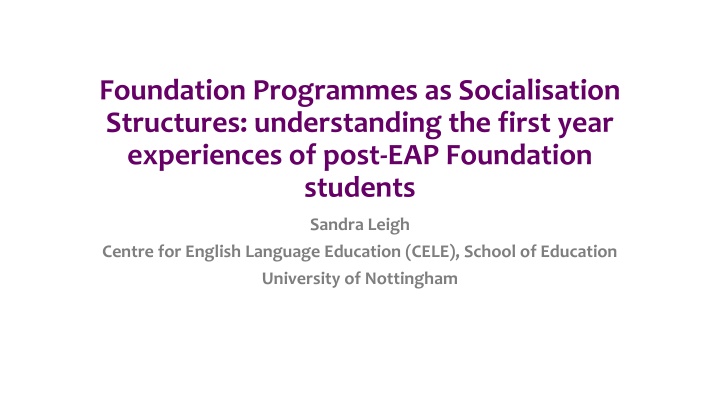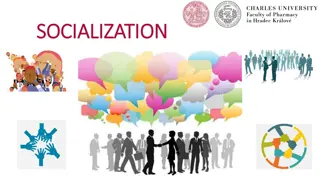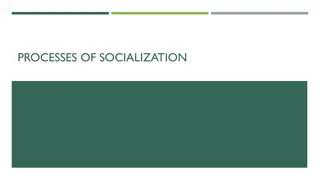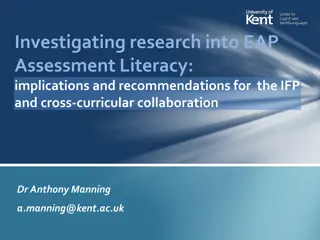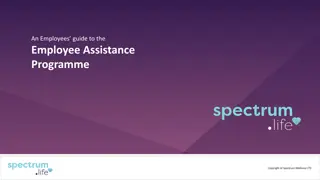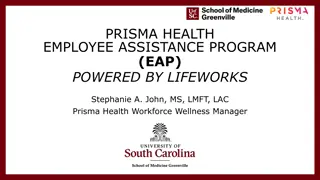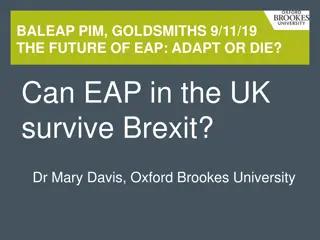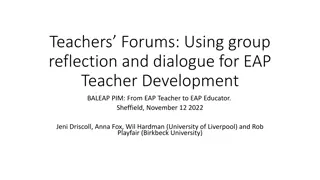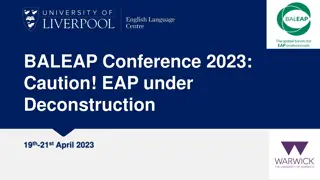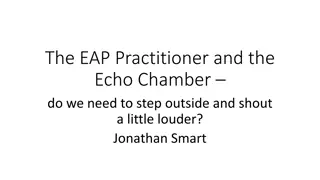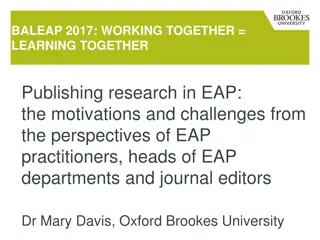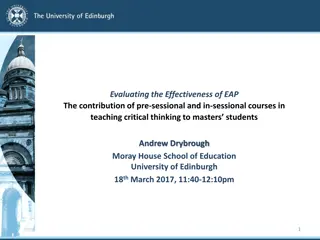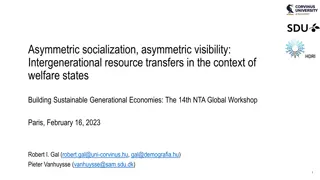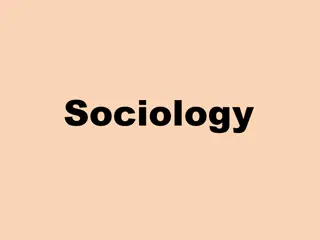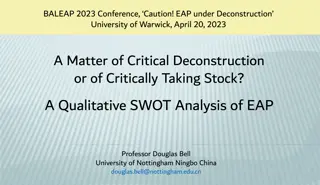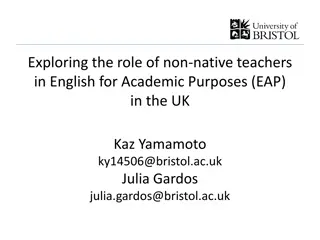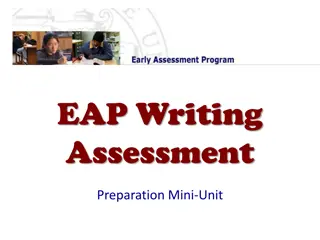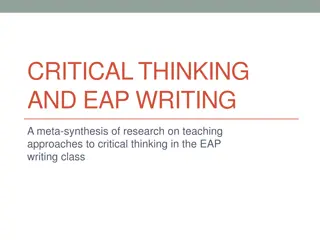Exploring the Socialization Experiences of Post-EAP Students
This research delves into the first-year experiences of post-EAP students at the University of Nottingham, focusing on socialization structures, challenges faced by international and first-year students, and the impact of English for Academic Purposes (EAP) programs. The study aims to understand the socialization journeys of students post-EAP and enhance the effectiveness of EAP in supporting students' transition and success in the academic environment.
Download Presentation

Please find below an Image/Link to download the presentation.
The content on the website is provided AS IS for your information and personal use only. It may not be sold, licensed, or shared on other websites without obtaining consent from the author.If you encounter any issues during the download, it is possible that the publisher has removed the file from their server.
You are allowed to download the files provided on this website for personal or commercial use, subject to the condition that they are used lawfully. All files are the property of their respective owners.
The content on the website is provided AS IS for your information and personal use only. It may not be sold, licensed, or shared on other websites without obtaining consent from the author.
E N D
Presentation Transcript
Foundation Programmes as Socialisation Structures: understanding the first year experiences of post-EAP Foundation students Sandra Leigh Centre for English Language Education (CELE), School of Education University of Nottingham
Outline Background & contexts Research Questions Theoretical Framework Methodology The Findings Conclusions
International Students: common challenges Adjusting to a new environment; acculturation Making friends - isolation English language proficiency (Andrade, 2009) Personal factors (Phakiti et al, 2013) personal, pedagogical and psychological factors are as important as organisational and social cultures in influencing students' adaptation, identity change and ultimate success (Gu et al, 2009: 19)
1StYear Students: common challenges Adjusting to a new environment; acculturation Collaborating with peers/others Autonomy
Teaching Context CELE s Foundation programme Two pathways: Business students and non-Business students Mainly EAP programme: 9 contact hours for English Subject specific modules Critical Thinking module
Research Context EdD: doctorate in Education Practitioners with sufficient experience in their fields Empirical research linked to professional practice Focus on impacting change in practice/workplace
Research EAP theoretical aspirations EAP s 50 year evolution: skill-focused to discourse approach Gap: what happens to students post-EAP? How successful are they? How smooth was their transition into their new academic environment? How effective is our input?
Research Questions 1. What are the socialisation experiences of post-EAP students? 2. What is EAP s contribution to these experiences? 3. How can EAP more effectively contribute to the experiences of these students?
Theoretical Framework: socialisation theories Necessity of adult socialisation - role changes, discontinuity, ambiguity Relevance to HE (retention rates) - new students - international students - non-traditional students
Theoretical Framework: socialisation theories the process by which persons acquire the knowledge, skills, and disposition that make them more or less able members of their society (Brim, 1966: 3)
Socialisation Theories Criticisms: indoctrination Process of becoming an effective and participatory member Interaction with others (socialising agents) Bidirectional (agents and socialisees) Ongoing and recursive Linguistic socialisation Agency Identity
Theoretical Framework: socialisation theories there is a specific point of entry and exit between which there are changes (Wheeler, 1966) a learning process and socialisees learn through trial & error and by doing (Bragg, 1976)
Socialisation Theories - stages 4 stages (Weidman, 1987) Anticipatory Formal Informal (peer socialisation) Personal
Methodology: 1-1 semi-structured interviews 1. Students 5 interviews 2. 1styear Lecturers 3. EAP (Foundation) tutors 13 students over a year (2015-16) = 62 interviews 6 lecturers and 4 EAP tutors = staff interviews
The Findings the positive Academic writing skills & conventions knowledge & expectations of HE context increased linguistic competence Non-academic supportive relationships familiarity with context
The Findings the positive Tony: Foundation year has given this advantage of being familiar with the university Victoria: It {Foundation} has helped me integrate into university life Ghassan: I also feel a bit ahead of everyone cause I also have experience with submitting papers I know where everything is
The Findings not so positive Academic workload specificity of content & language task types level of autonomy Non-academic working with home students relationships with lecturers
The Findings not so positive Content: Yixuan: Some of my classmates . . . they study foundation programme maybe in China or in Malaysia campus . . . When I ask them they study more about the subject . . . And which makes me like oh they all study this before . . . But for me it s really totally new knowledge Victoria: Because I feel the things I ve learnt in Foundation Course so far are not applicable to my law degree cause many students from Singapore came from Bellerbys college where they have a Foundation Programme and they did the law foundation programme and they learn all the basics of law that me and Rebecca and everyone else that came here are struggling through cause we have no idea and its really tough to follow up
The Findings not so positive Workload: Naomi: The workload (on Foundation) was like lighter than in high school and a lot lighter than . . . so it maybe just for me it kinda projected a false image Victoria: University has been crazy stressful . . yeah hard to handle it s been I think nine weeks now right . . . It s been crazy very stressful hard to cope you know struggling honestly . . . assignments due every week tutorials there s always something to do you know there s never one day where you can just be like oh there s nothing to do it s like it s . . . This deadline, you know next deadline coursework, tutorials, seminars . . . yeah non-stop
The Findings - other Impact of spaces on students integration physical spaces e-spaces & online resources
The Findings other Online Resources Grace: YouTube . . . makes things easier if you don t understand some things in the lecture and someone has said something you just Google it up and simplified it there Amira: I Google everything . . . everything . . . Rather than using a book I do my reading online . . . Yes Google is my professor . . . I would fail without Google
Conclusions reached Students developed the necessary skills & knowledge Part of HE institutional socialisation structures Gaps or mismatches: more tailoring of courses increase their level of autonomy
Developing a knowledge triangle EAP/Foundation Practitioners: language experts, teaching international students Former Students: feedback, peer mentors, coping strategies Subject Academics: practical & disciplinary expertise
References Andrade, M. S. 2009. The Effects of English Language Proficiency on Adjustment to University Life. International Multilingual Research Journal, 3(1): 16-34 DOI: 10.1080/19313150802668249 Bragg, A. K. 1976. The Socialization Process in Higher Education. [Online]. Washington, D.C.: Publications Department, American Association for Higher Education. Available at: https://eric.ed.gov/?id=ED132909 Brim, O. G. 1966. Socialization through the Life Cycle. In Socialization after Childhood: Two essays (pp. 3-49). New York: John Wiley Ginty, C. & Boland, J. 2016. Supporting the First Year Experience in Higher Education in Ireland: Impact on Student Engagement, Teaching Practice and Institutional Policy. Student Engagement and Experience Journal, 5(1): 1-47 DOI: 10.7190/seej.v4i1.119
References Gu, Q., Schweisfurth, M. & Day, C. 2010. Learning and Growing in a Foreign Context: Intercultural Experiences of International Students. Compare, 40(1): 7 23 DOI:10.1080/03057920903115983 Phakiti, A., Hirsh, D. & Woodrow, L. 2013. It s not only English: Effects of Other Individual Factors on English Language Learning and Academic Learning of ESL. Journal of Research in International Education, 12(3) 239 258 DOI: 10.1177/1475240913513520 Weidman, J. C. 1987. Undergraduate Socialization. ASHE Annual Meeting Paper. ASHE Annual Meeting. Paper presented at the Annual Meeting of the Association for the Study of Higher Education. Baltimore, MD. Wheeler, S. 1966. The Structure of Formally Organized Socialization Settings. In Socialization after Childhood: Two Essays (pp. 51-116). New York: John Wiley.
